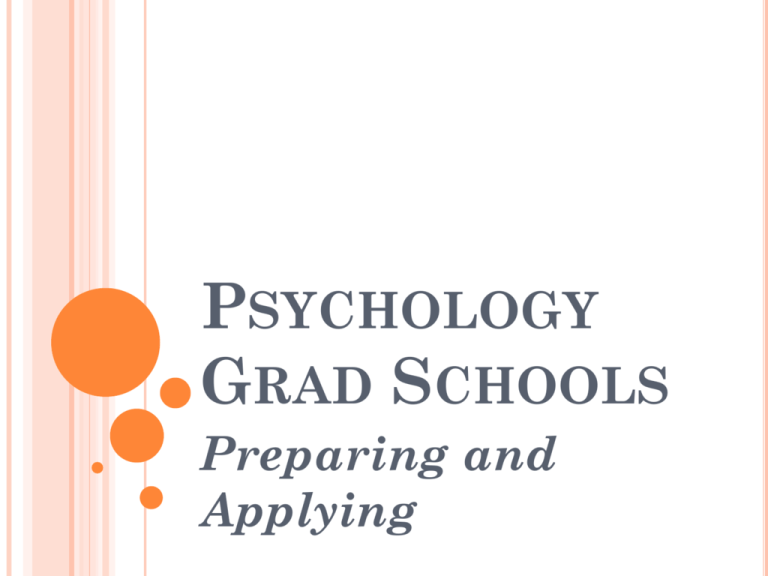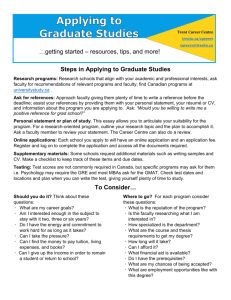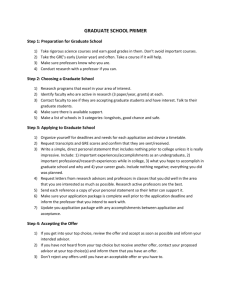Grad Schools - the Department of Psychology at Illinois State
advertisement

PSYCHOLOGY GRAD SCHOOLS Preparing and Applying OVERVIEW Criteria for Graduate School Admission Vita Development Personal Statement Development Graduate Record Exam (GRE) Recommendation Letters How to Choose Programs Strategies for a Successful Application References/Recommended Reading CRITERIA FOR GRADUATE SCHOOL ADMISSION GPA (cumulative, last 60 hours, major) GRE Letters of Recommendation Research Experience Match with the Program Personal Statement / Statement of Purpose Rigorous Courses Taken Honors / Awards / Scholarships Volunteer / Field Experience Teaching Experience Psi Chi Membership CURRICULUM VITAE DEVELOPMENT 1) Personal information (address, phone number) 2. Education (degrees earned, when and where) 3) Honors and awards (list each, who awarded, and date awarded) 4) Association memberships (relevant clubs and societies, student affiliate status) 5) Research interests (if applicable and appropriate) 6) Research and teaching experience (if applicable and appropriate) 7) Professional presentations (titles, organizations, in APA format if possible) 8) Publications (use APA format, be careful with “in press”, “under review”) 9) References (list names, titles, and addresses of three to four people whom you have asked) CURRICULUM VITAE DEVELOPMENT Obtain Clinical Experience PATH Stepping Stones Baby Fold Join a Professional Organization SPA PSI CHI Do not list high school accomplishments unless they are critical in demonstrating your potential as a graduate student. PERSONAL STATEMENT DEVELOPMENT (Keith-Spiegel & Wiederman, 2000) 1) Career plans (What do you see yourself doing 5 years from now?) 2) General interest areas (What are your academic interests? 3) Research experiences (What did you do as a research assistant?) 4) Academic objectives (Why are you interested in graduate study?) 5) Clinical or other field experience/practicum/internship 6) Academic background and achievements (Are your GRE scores and GPA representative of your ability?) 7) What do you see in us (Why did you choose us?) 8) Motivation (Why did you choose graduate study?) 9) Personal material (What do you think we should know about you?) 10) Autobiography (Tell us about your background) 11) Specific graduate faculty of interest (Whom would you like to work with in our graduate program?) 12) Anything else we should know? 13) Special skills (Languages known, mathematics, computer skills) GENERAL RECORD EXAM (GRE) General Test New Test Format 1 hour longer (4 hours vs. 3 hours) Scoring Change (340 total vs. 1600 total) Test Format (2 verbal & 2 math vs. 1 of each) Adaptive by section (vs. adaptive by question) An on-screen calculator will be available New question types numeric entry, multiple answers, sentence equivalence No more analogies or antonyms Increased focus on statistics & coordinate geometry High scorers will need to know the quadratic equation Psychology Subject Test Sign up at www.gre.org $160 LETTERS OF RECOMMENDATION Establish relationships with your professors early on in your academic career. Get to know them outside of the classroom through research or teaching opportunities. Schools typically ask for 2-3 letters. The best sources for letters are: A faculty mentor who has worked closely with you and has supervised a considerable amount of your work. A professor who has significant publication reputation in the area of specialization that you are applying. An employer on a job that is related to your professional goals. (Keith-Spiegel & Wiederman, 2000) HOW TO CHOOSE PROGRAMS: SOME THINGS TO CONSIDER Financing Competitiveness of the program Match Interests/Career Goals Career opportunities/connections Research and faculty interests Search for programs in your area of interest GET INPUT FROM PROFESSORS Program Quality Which programs are best for you Quality of Faculty Level of Faculty interaction with students Location Ask if you can contact current students STRATEGIES FOR A SUCCESSFUL APPLICATION (Buskist, 2001) 1) Be organized 2) Develop competencies as an undergraduate 3) Settle on a specialty area 4) Involve yourself in undergraduate research 5) Do homework/research on potential graduate schools 6) Identify potential major professors whom you would like to work with in the programs you are applying to 7) Write an outstanding personal statement or letter of intent REFERENCES / RECOMMENDED READING Meet with a graduate advisor at Career Services Suzy Baker-Bachman for Psychology http://www.careercenter.ilstu.edu/downloads/StaffAdvisementListFa ll2010.pdf Buskist, W. (2002, Spring). Seven tips for preparing a successful application to graduate school in psychology. Eye on Psi Chi, 5(3), 32-34. Keith-Spiegel, P., & Wiederman, M.W. (2000). The complete guide to graduate school admission: Psychology, counseling, and related professions (2nd ed.). Mahwah, NJ: Erlbaum. Sanders, C. E. (2005) What every student should know about applying to psychology graduate schools. Colorado State University. FACULTY/STUDENT INTRODUCTIONS Brief description of your program and area The graduate school and program you attended or are attending OPEN DISCUSSION Example Questions Why go to grad school How to pay for grad school Top programs in area of interest What to look for in schools How to know a program is a good one How many programs to apply to How to ask for letters of recommendation What to expect in grad school





